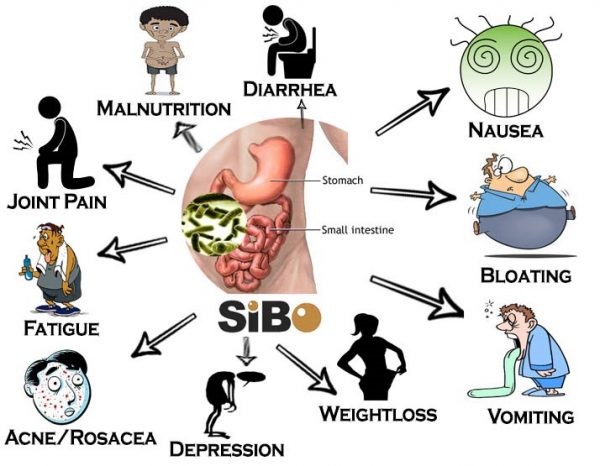Definition
Intestinal bacterial overgrowth syndrome is also known as "small intestinal bacterial overgrowth" (SIBO) in English. Still little known, it often overlaps with or is frequently associated with irritable bowel syndrome, with which it shares many symptoms. Some research suggests that SIBO is present in 80% of cases where irritable bowel syndrome occurs.
It is one of the most common causes of malabsorption. Bacterial overgrowth syndrome is diagnosed when the number of bacteria present in the small intestine exceeds 105 bacteria/mL. The problem is not the quality of the bacteria, but rather the excessively high number of normal bacteria in the wrong place. By multiplying in the small intestine, these bacteria, which feed on carbohydrates, produce gases that could cause various symptoms.
Intestinal bacterial concentration is maintained by various factors such as the movement of intestinal contents (peristalsis), gastric acid production, and mucus. In individuals with intestinal bacterial overgrowth syndrome, some of these factors may be impaired, allowing intestinal bacteria to proliferate and leading to malabsorption of ingested nutrients as well as other symptoms.
Etiology
The cause of intestinal bacterial overgrowth syndrome is not yet clearly determined.
It could be caused by disorders that decrease or slow the movement of intestinal contents, reduce the clearance of excess bacteria, and consequently allow certain bacteria normally present in the intestine to proliferate. The causes of this syndrome could be grouped into 4 categories:
-
Medication use
They can occur during long-term treatment with proton pump inhibitors (often prescribed to relieve gastric reflux).
-
Anatomical abnormalities and/or changes of the stomach and/or small intestine
They can be caused by diseases such as diverticulosis or occur following surgical interventions like gastrectomy.
-
Intestinal motility disorders
They can be caused by various diseases such as scleroderma, diabetes mellitus, chronic pancreatitis, hypothyroidism, etc. Indeed, diabetes is the most common cause of slowed intestinal movements.
Irritable bowel syndrome or celiac disease are also factors with a fairly high prevalence of SIBO.
-
Absence of gastric acid secretion (achlorhydria)
Associated with intestinal motility disorders, it can cause bacterial overgrowth, especially in elderly people.
Symptoms

Symptoms of bacterial overgrowth syndrome can include extra-digestive symptoms such as chronic fatigue or concentration disorders, headaches, joint pain, eczema, rosacea, asthma, depression
Of course, there are digestive symptoms such as abdominal pain, bloating, gas, belching, nausea, reflux, constipation, diarrhea, or steatorrhea (oily diarrhea). Indeed, excess intestinal bacteria alter bile salts involved in fat digestion, leading to fat malabsorption and possibly causing steatorrhea or anemia.
However, many people with this syndrome are asymptomatic and only present weight loss or nutritional deficiencies. Indeed, the excess bacteria consume ingested nutrients, especially carbohydrates and vitamin B12, which can lead to deficiencies in calories, vitamins, and minerals.
Diagnosis
Currently, the reference diagnostic test for bacterial overgrowth syndrome is the culture of a sample of intestinal fluid showing a bacterial concentration greater than 105 bacteria/mL. However, this test has some limitations. Indeed, it is invasive as it requires endoscopy, it is costly, carries risks of contamination, may not detect the syndrome if it is present in a more distant section of the small intestine, and culturing intestinal bacteria can be challenging. To overcome these drawbacks, indirect detection methods of the syndrome have been developed.
For example, there are now non-invasive breath tests, but these tests are also less sensitive and less specific. Therefore, more research is needed to develop less invasive diagnostic methods for intestinal bacterial overgrowth syndrome.
Treatment
Medical treatment of bacterial overgrowth syndrome includes antibiotics such as rifaximin or metronidazole and dietary modifications. One-third of patients would be cured with a single antibiotic prescription. However, relapses remain frequent because the cause of SIBO must also be addressed. The challenge for gastroenterologists is to treat the underlying dysfunction that causes bacterial overgrowth. In some cases, unfortunately, this is almost impossible. It is, however, possible to treat with antibiotics more than once, and some medications can also help speed up small intestine motility. Additionally, gastroenterologists suggest probiotic courses as well as a low FODMAP diet to help patients regain digestive comfort.
Nutritional approach
The nutritional approach to bacterial overgrowth syndrome involves modifying the diet. Indeed, adopting a low-carbohydrate (FODMAP diet) and high-fat diet is generally recommended. This diet can be beneficial to limit digestive symptoms and malabsorption since intestinal bacteria mainly consume carbohydrates rather than fats. This diet thus helps limit bacterial growth. Finally, quality dietary supplements can also be used to prevent or correct nutritional deficiencies in calories, vitamins, minerals, etc.
As with other causes of malabsorption, the nutritional approach to intestinal bacterial overgrowth syndrome aims to adjust dietary intake to provide the most adequate and balanced diet possible while limiting digestive symptoms and avoiding worsening malabsorption. These adjustments may require the assistance of a dietitian to determine dietary intakes adapted to each individual's needs, to define appropriate foods, and to implement personalized dietary strategies.
References
- Dibaise, J. K. “Assessment of malabsorption.” Modern Nutrition in Health and Disease, by A. Catharine Ross, Wolters Kluwer/Lippincott Williams & Wilkins, 2014, pp. 1054–1057.
- https://www.merckmanuals.com/fr-ca/professional/troubles-gastro-intestinaux/syndromes-de-malabsorption/syndrome-de-pullulation-bact%C3%A9rienne
- https://www.merckmanuals.com/fr-ca/accueil/troubles-digestifs/malabsorption/syndrome-de-prolif%C3%A9ration-bact%C3%A9rienne
- https://www.merckmanuals.com/fr-ca/accueil/les-faits-en-bref-troubles-digestifs/malabsorption/syndrome-de-prolif%C3%A9ration-bact%C3%A9rienne
- https://www.quebecscience.qc.ca/sciences/sibo-trouble-digestif-traitement-delicat/
- Detail- Forum Médical Suisse (medicalforum.ch)

